Developing Academic Skills: Time Management, Integrity & Resources
VerifiedAdded on 2023/06/18
|14
|4043
|328
Report
AI Summary
This report explores the development of academic skills, focusing on time management, academic integrity, and the use of key resources. It details the creation and reflection on a study timetable, incorporating techniques like the Pomodoro method and Gibbs reflective cycle. The report identifies essential resources such as note-making, Google, stopwatches, books, and lectures, and discusses the importance of academic skills like research, regularity, referencing, and summarizing. Furthermore, it provides summaries of online articles related to academic integrity and plagiarism, emphasizing the importance of understanding and avoiding unintentional plagiarism. The aim is to enhance students' abilities to manage their time effectively, maintain academic integrity, and utilize resources to support their studies, all of which are critical for academic success and career development.
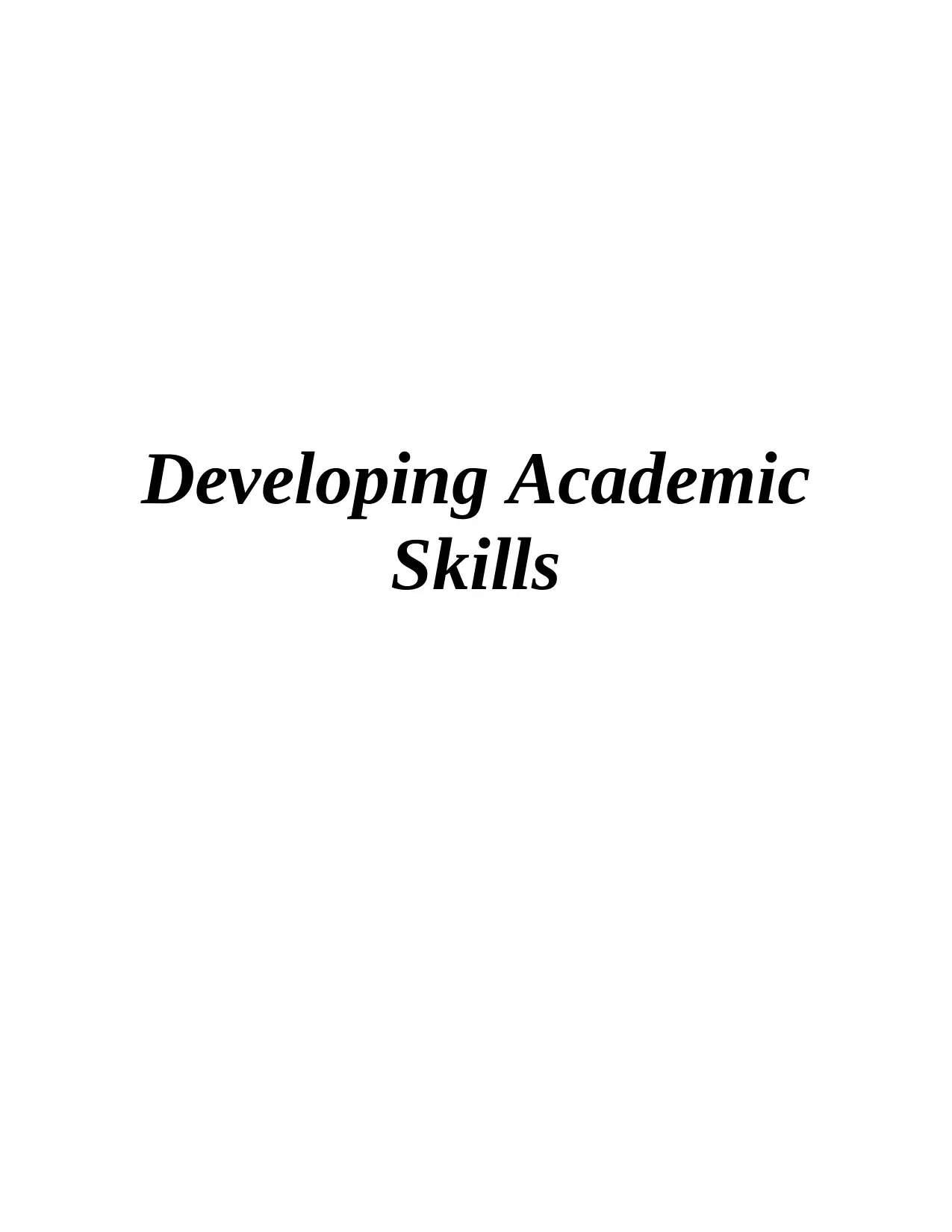
Developing Academic
Skills
Skills
Paraphrase This Document
Need a fresh take? Get an instant paraphrase of this document with our AI Paraphraser
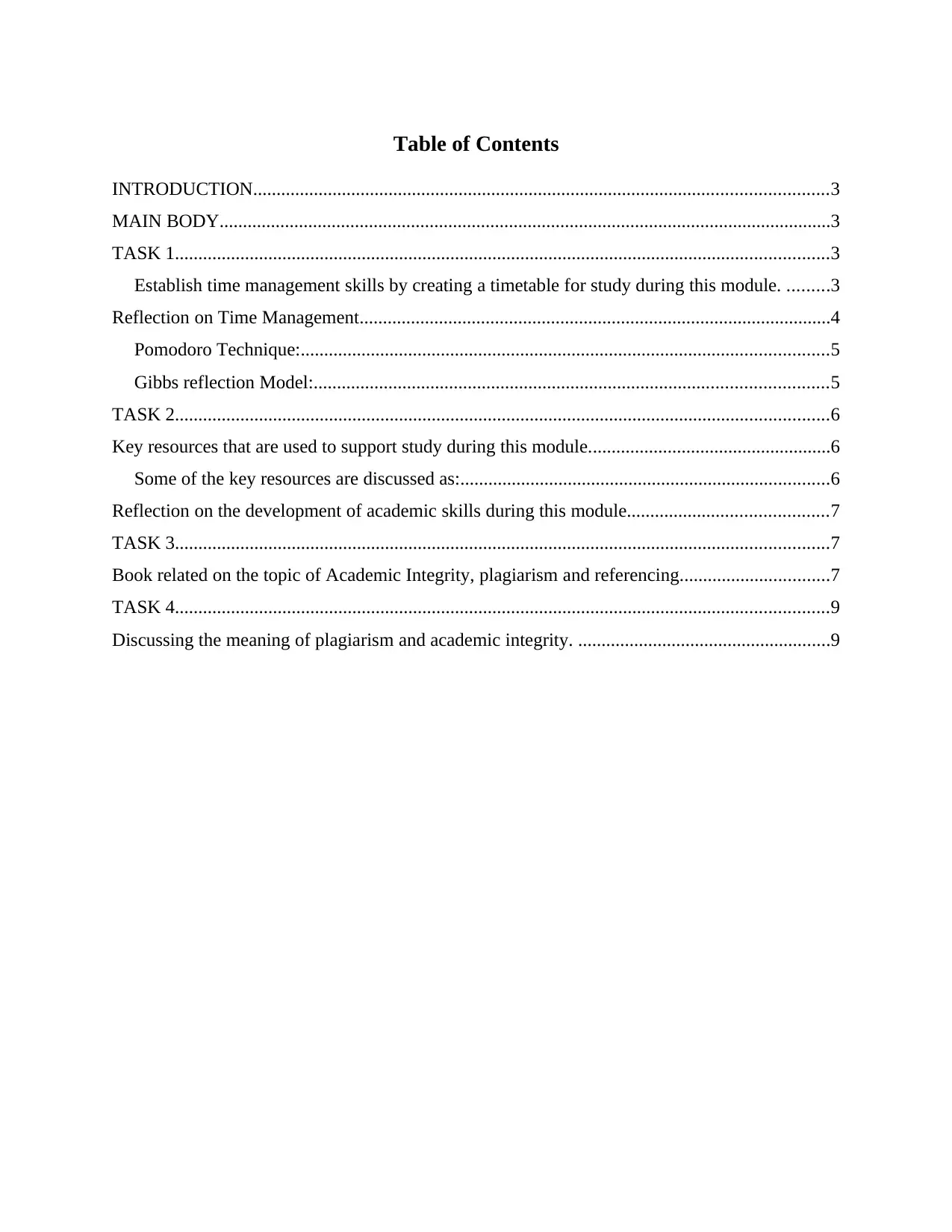
Table of Contents
INTRODUCTION...........................................................................................................................3
MAIN BODY...................................................................................................................................3
TASK 1............................................................................................................................................3
Establish time management skills by creating a timetable for study during this module. .........3
Reflection on Time Management.....................................................................................................4
Pomodoro Technique:.................................................................................................................5
Gibbs reflection Model:..............................................................................................................5
TASK 2............................................................................................................................................6
Key resources that are used to support study during this module....................................................6
Some of the key resources are discussed as:...............................................................................6
Reflection on the development of academic skills during this module...........................................7
TASK 3............................................................................................................................................7
Book related on the topic of Academic Integrity, plagiarism and referencing................................7
TASK 4............................................................................................................................................9
Discussing the meaning of plagiarism and academic integrity. ......................................................9
INTRODUCTION...........................................................................................................................3
MAIN BODY...................................................................................................................................3
TASK 1............................................................................................................................................3
Establish time management skills by creating a timetable for study during this module. .........3
Reflection on Time Management.....................................................................................................4
Pomodoro Technique:.................................................................................................................5
Gibbs reflection Model:..............................................................................................................5
TASK 2............................................................................................................................................6
Key resources that are used to support study during this module....................................................6
Some of the key resources are discussed as:...............................................................................6
Reflection on the development of academic skills during this module...........................................7
TASK 3............................................................................................................................................7
Book related on the topic of Academic Integrity, plagiarism and referencing................................7
TASK 4............................................................................................................................................9
Discussing the meaning of plagiarism and academic integrity. ......................................................9
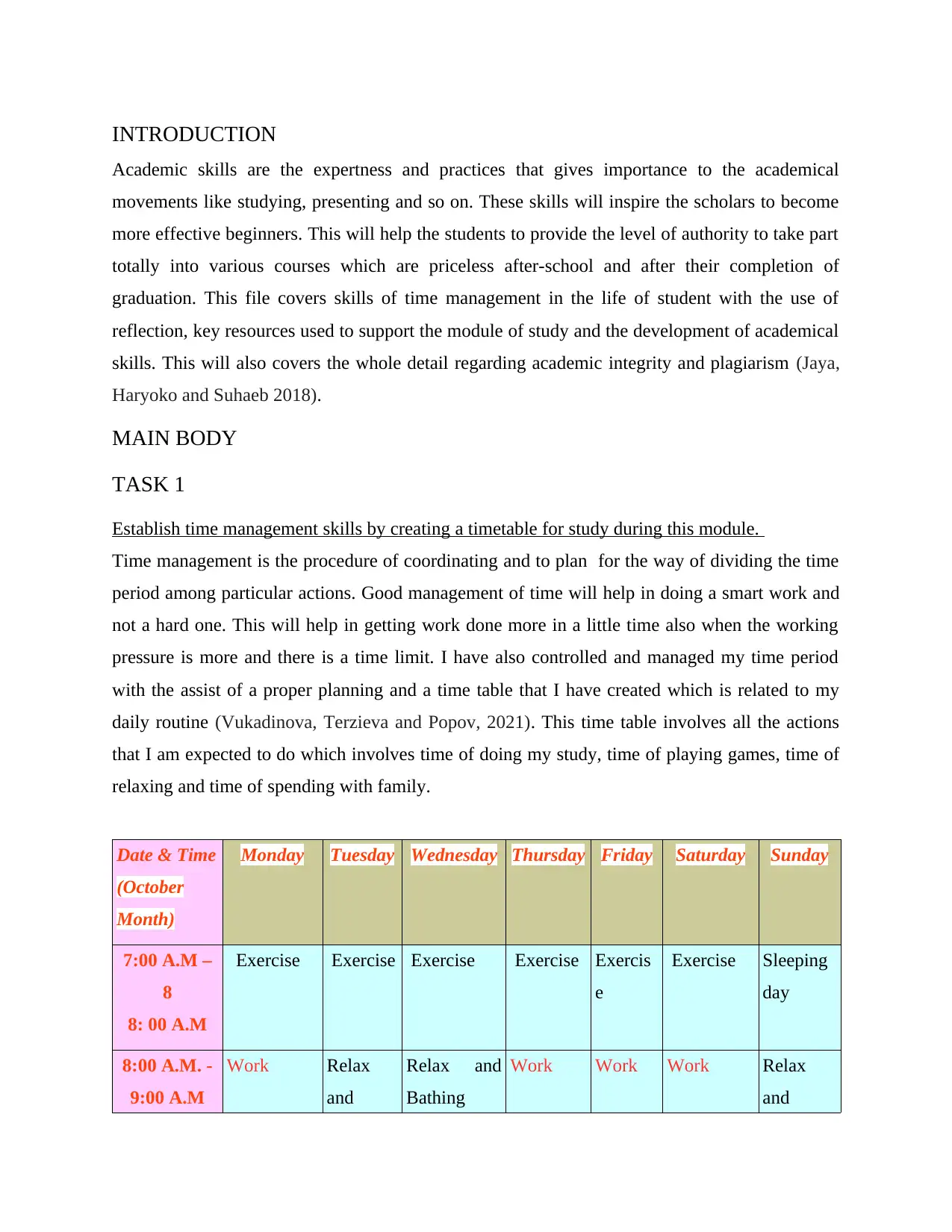
INTRODUCTION
Academic skills are the expertness and practices that gives importance to the academical
movements like studying, presenting and so on. These skills will inspire the scholars to become
more effective beginners. This will help the students to provide the level of authority to take part
totally into various courses which are priceless after-school and after their completion of
graduation. This file covers skills of time management in the life of student with the use of
reflection, key resources used to support the module of study and the development of academical
skills. This will also covers the whole detail regarding academic integrity and plagiarism (Jaya,
Haryoko and Suhaeb 2018).
MAIN BODY
TASK 1
Establish time management skills by creating a timetable for study during this module.
Time management is the procedure of coordinating and to plan for the way of dividing the time
period among particular actions. Good management of time will help in doing a smart work and
not a hard one. This will help in getting work done more in a little time also when the working
pressure is more and there is a time limit. I have also controlled and managed my time period
with the assist of a proper planning and a time table that I have created which is related to my
daily routine (Vukadinova, Terzieva and Popov, 2021). This time table involves all the actions
that I am expected to do which involves time of doing my study, time of playing games, time of
relaxing and time of spending with family.
Date & Time
(October
Month)
Monday Tuesday Wednesday Thursday Friday Saturday Sunday
7:00 A.M –
8
8: 00 A.M
Exercise Exercise Exercise Exercise Exercis
e
Exercise Sleeping
day
8:00 A.M. -
9:00 A.M
Work Relax
and
Relax and
Bathing
Work Work Work Relax
and
Academic skills are the expertness and practices that gives importance to the academical
movements like studying, presenting and so on. These skills will inspire the scholars to become
more effective beginners. This will help the students to provide the level of authority to take part
totally into various courses which are priceless after-school and after their completion of
graduation. This file covers skills of time management in the life of student with the use of
reflection, key resources used to support the module of study and the development of academical
skills. This will also covers the whole detail regarding academic integrity and plagiarism (Jaya,
Haryoko and Suhaeb 2018).
MAIN BODY
TASK 1
Establish time management skills by creating a timetable for study during this module.
Time management is the procedure of coordinating and to plan for the way of dividing the time
period among particular actions. Good management of time will help in doing a smart work and
not a hard one. This will help in getting work done more in a little time also when the working
pressure is more and there is a time limit. I have also controlled and managed my time period
with the assist of a proper planning and a time table that I have created which is related to my
daily routine (Vukadinova, Terzieva and Popov, 2021). This time table involves all the actions
that I am expected to do which involves time of doing my study, time of playing games, time of
relaxing and time of spending with family.
Date & Time
(October
Month)
Monday Tuesday Wednesday Thursday Friday Saturday Sunday
7:00 A.M –
8
8: 00 A.M
Exercise Exercise Exercise Exercise Exercis
e
Exercise Sleeping
day
8:00 A.M. -
9:00 A.M
Work Relax
and
Relax and
Bathing
Work Work Work Relax
and
⊘ This is a preview!⊘
Do you want full access?
Subscribe today to unlock all pages.

Trusted by 1+ million students worldwide
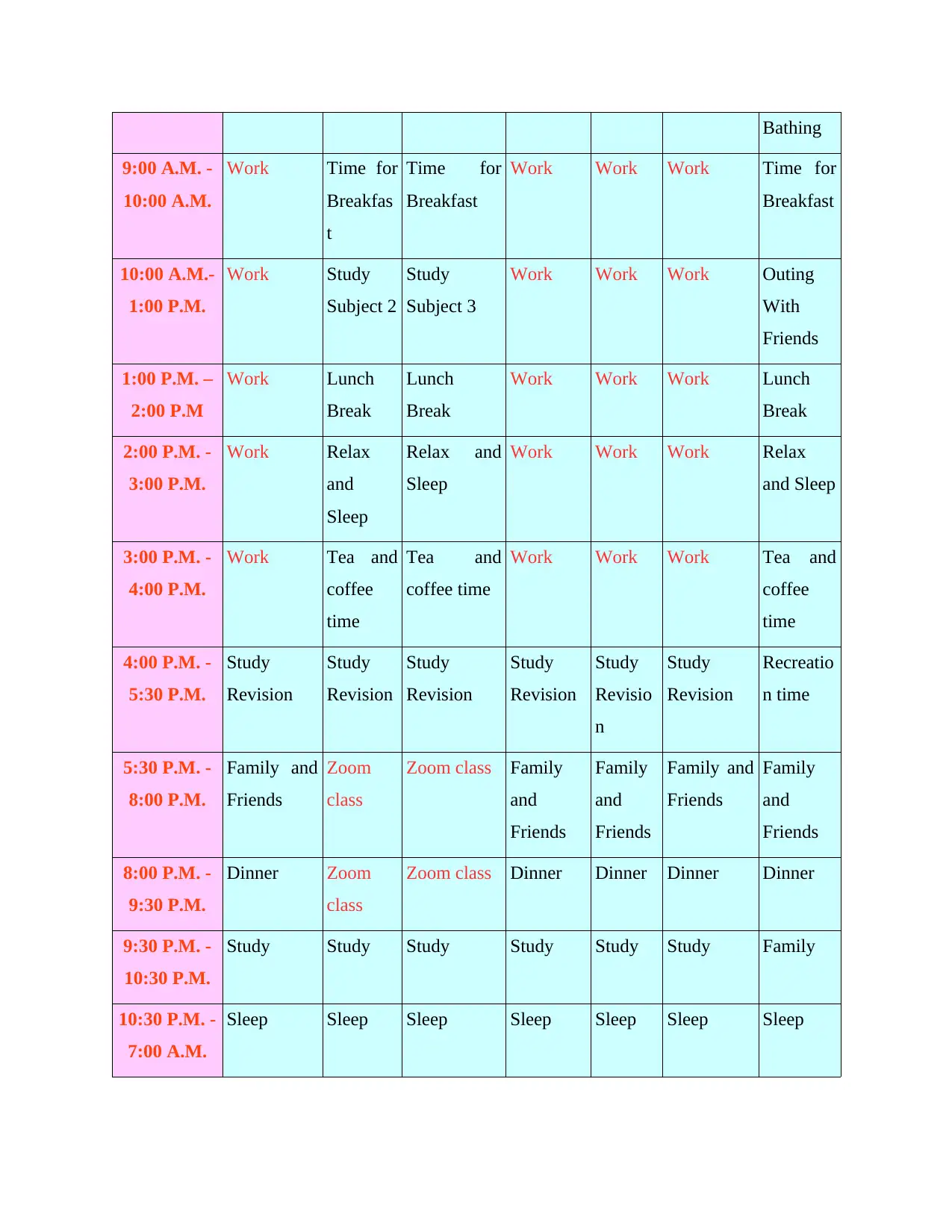
Bathing
9:00 A.M. -
10:00 A.M.
Work Time for
Breakfas
t
Time for
Breakfast
Work Work Work Time for
Breakfast
10:00 A.M.-
1:00 P.M.
Work Study
Subject 2
Study
Subject 3
Work Work Work Outing
With
Friends
1:00 P.M. –
2:00 P.M
Work Lunch
Break
Lunch
Break
Work Work Work Lunch
Break
2:00 P.M. -
3:00 P.M.
Work Relax
and
Sleep
Relax and
Sleep
Work Work Work Relax
and Sleep
3:00 P.M. -
4:00 P.M.
Work Tea and
coffee
time
Tea and
coffee time
Work Work Work Tea and
coffee
time
4:00 P.M. -
5:30 P.M.
Study
Revision
Study
Revision
Study
Revision
Study
Revision
Study
Revisio
n
Study
Revision
Recreatio
n time
5:30 P.M. -
8:00 P.M.
Family and
Friends
Zoom
class
Zoom class Family
and
Friends
Family
and
Friends
Family and
Friends
Family
and
Friends
8:00 P.M. -
9:30 P.M.
Dinner Zoom
class
Zoom class Dinner Dinner Dinner Dinner
9:30 P.M. -
10:30 P.M.
Study Study Study Study Study Study Family
10:30 P.M. -
7:00 A.M.
Sleep Sleep Sleep Sleep Sleep Sleep Sleep
9:00 A.M. -
10:00 A.M.
Work Time for
Breakfas
t
Time for
Breakfast
Work Work Work Time for
Breakfast
10:00 A.M.-
1:00 P.M.
Work Study
Subject 2
Study
Subject 3
Work Work Work Outing
With
Friends
1:00 P.M. –
2:00 P.M
Work Lunch
Break
Lunch
Break
Work Work Work Lunch
Break
2:00 P.M. -
3:00 P.M.
Work Relax
and
Sleep
Relax and
Sleep
Work Work Work Relax
and Sleep
3:00 P.M. -
4:00 P.M.
Work Tea and
coffee
time
Tea and
coffee time
Work Work Work Tea and
coffee
time
4:00 P.M. -
5:30 P.M.
Study
Revision
Study
Revision
Study
Revision
Study
Revision
Study
Revisio
n
Study
Revision
Recreatio
n time
5:30 P.M. -
8:00 P.M.
Family and
Friends
Zoom
class
Zoom class Family
and
Friends
Family
and
Friends
Family and
Friends
Family
and
Friends
8:00 P.M. -
9:30 P.M.
Dinner Zoom
class
Zoom class Dinner Dinner Dinner Dinner
9:30 P.M. -
10:30 P.M.
Study Study Study Study Study Study Family
10:30 P.M. -
7:00 A.M.
Sleep Sleep Sleep Sleep Sleep Sleep Sleep
Paraphrase This Document
Need a fresh take? Get an instant paraphrase of this document with our AI Paraphraser
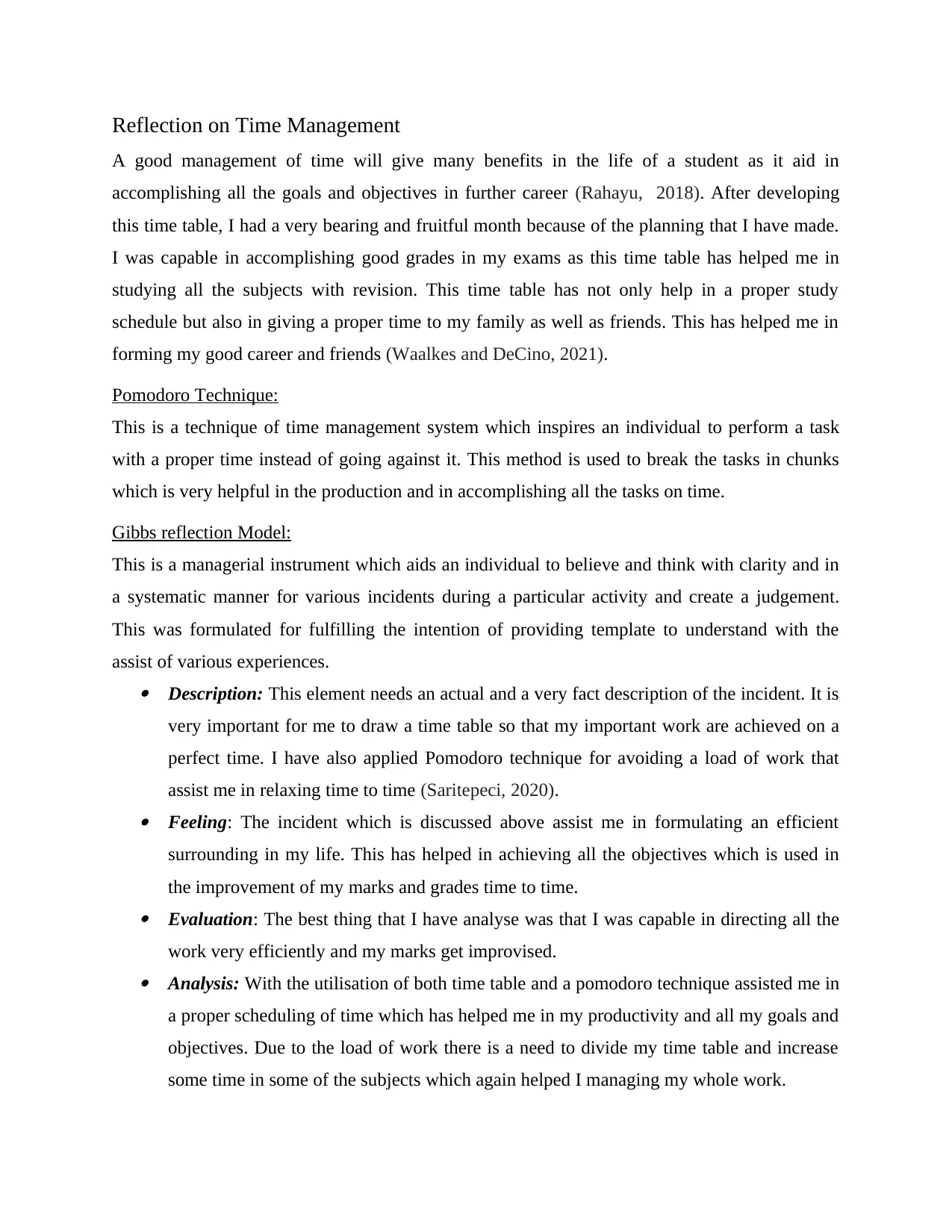
Reflection on Time Management
A good management of time will give many benefits in the life of a student as it aid in
accomplishing all the goals and objectives in further career (Rahayu, 2018). After developing
this time table, I had a very bearing and fruitful month because of the planning that I have made.
I was capable in accomplishing good grades in my exams as this time table has helped me in
studying all the subjects with revision. This time table has not only help in a proper study
schedule but also in giving a proper time to my family as well as friends. This has helped me in
forming my good career and friends (Waalkes and DeCino, 2021).
Pomodoro Technique:
This is a technique of time management system which inspires an individual to perform a task
with a proper time instead of going against it. This method is used to break the tasks in chunks
which is very helpful in the production and in accomplishing all the tasks on time.
Gibbs reflection Model:
This is a managerial instrument which aids an individual to believe and think with clarity and in
a systematic manner for various incidents during a particular activity and create a judgement.
This was formulated for fulfilling the intention of providing template to understand with the
assist of various experiences. Description: This element needs an actual and a very fact description of the incident. It is
very important for me to draw a time table so that my important work are achieved on a
perfect time. I have also applied Pomodoro technique for avoiding a load of work that
assist me in relaxing time to time (Saritepeci, 2020). Feeling: The incident which is discussed above assist me in formulating an efficient
surrounding in my life. This has helped in achieving all the objectives which is used in
the improvement of my marks and grades time to time. Evaluation: The best thing that I have analyse was that I was capable in directing all the
work very efficiently and my marks get improvised. Analysis: With the utilisation of both time table and a pomodoro technique assisted me in
a proper scheduling of time which has helped me in my productivity and all my goals and
objectives. Due to the load of work there is a need to divide my time table and increase
some time in some of the subjects which again helped I managing my whole work.
A good management of time will give many benefits in the life of a student as it aid in
accomplishing all the goals and objectives in further career (Rahayu, 2018). After developing
this time table, I had a very bearing and fruitful month because of the planning that I have made.
I was capable in accomplishing good grades in my exams as this time table has helped me in
studying all the subjects with revision. This time table has not only help in a proper study
schedule but also in giving a proper time to my family as well as friends. This has helped me in
forming my good career and friends (Waalkes and DeCino, 2021).
Pomodoro Technique:
This is a technique of time management system which inspires an individual to perform a task
with a proper time instead of going against it. This method is used to break the tasks in chunks
which is very helpful in the production and in accomplishing all the tasks on time.
Gibbs reflection Model:
This is a managerial instrument which aids an individual to believe and think with clarity and in
a systematic manner for various incidents during a particular activity and create a judgement.
This was formulated for fulfilling the intention of providing template to understand with the
assist of various experiences. Description: This element needs an actual and a very fact description of the incident. It is
very important for me to draw a time table so that my important work are achieved on a
perfect time. I have also applied Pomodoro technique for avoiding a load of work that
assist me in relaxing time to time (Saritepeci, 2020). Feeling: The incident which is discussed above assist me in formulating an efficient
surrounding in my life. This has helped in achieving all the objectives which is used in
the improvement of my marks and grades time to time. Evaluation: The best thing that I have analyse was that I was capable in directing all the
work very efficiently and my marks get improvised. Analysis: With the utilisation of both time table and a pomodoro technique assisted me in
a proper scheduling of time which has helped me in my productivity and all my goals and
objectives. Due to the load of work there is a need to divide my time table and increase
some time in some of the subjects which again helped I managing my whole work.
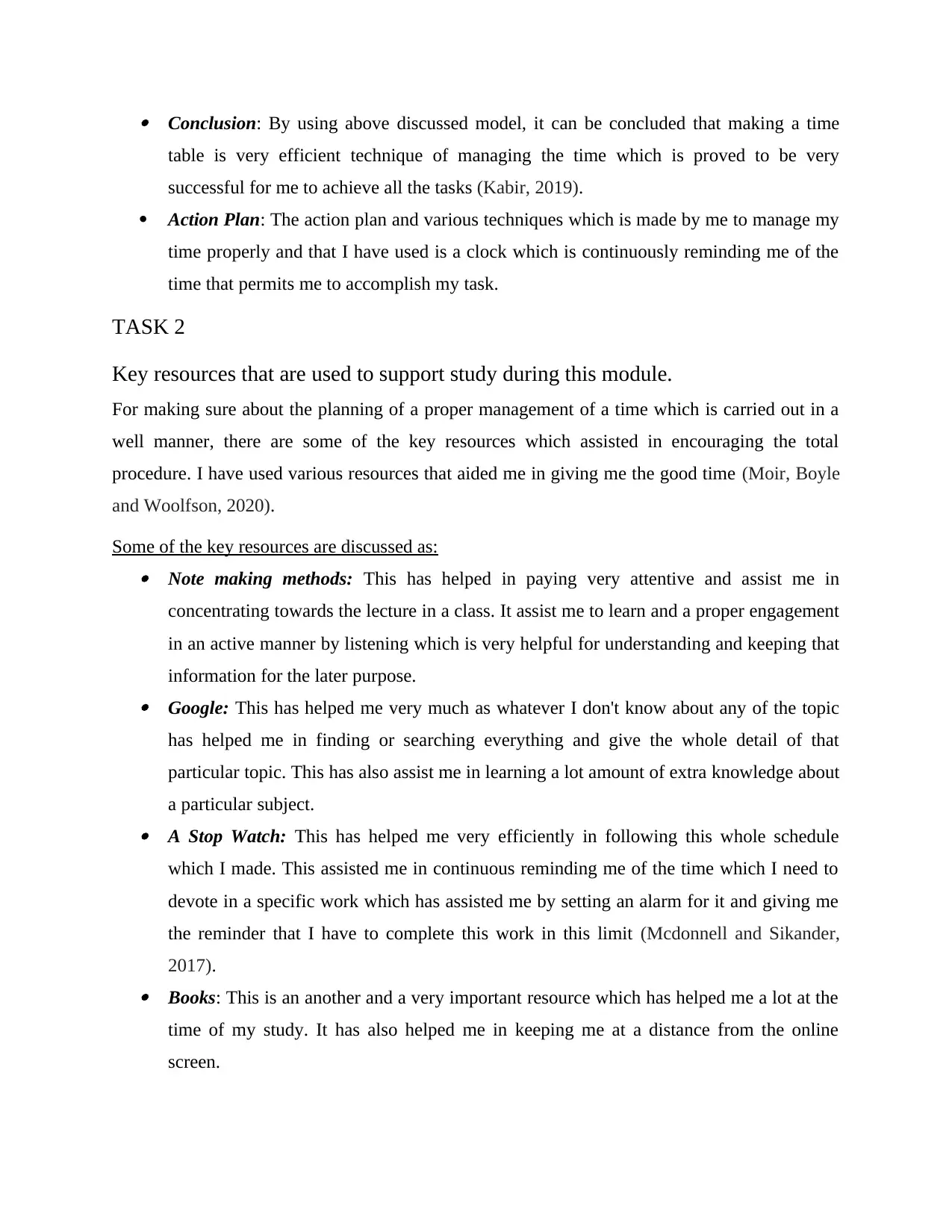
Conclusion: By using above discussed model, it can be concluded that making a time
table is very efficient technique of managing the time which is proved to be very
successful for me to achieve all the tasks (Kabir, 2019).
Action Plan: The action plan and various techniques which is made by me to manage my
time properly and that I have used is a clock which is continuously reminding me of the
time that permits me to accomplish my task.
TASK 2
Key resources that are used to support study during this module.
For making sure about the planning of a proper management of a time which is carried out in a
well manner, there are some of the key resources which assisted in encouraging the total
procedure. I have used various resources that aided me in giving me the good time (Moir, Boyle
and Woolfson, 2020).
Some of the key resources are discussed as: Note making methods: This has helped in paying very attentive and assist me in
concentrating towards the lecture in a class. It assist me to learn and a proper engagement
in an active manner by listening which is very helpful for understanding and keeping that
information for the later purpose. Google: This has helped me very much as whatever I don't know about any of the topic
has helped me in finding or searching everything and give the whole detail of that
particular topic. This has also assist me in learning a lot amount of extra knowledge about
a particular subject. A Stop Watch: This has helped me very efficiently in following this whole schedule
which I made. This assisted me in continuous reminding me of the time which I need to
devote in a specific work which has assisted me by setting an alarm for it and giving me
the reminder that I have to complete this work in this limit (Mcdonnell and Sikander,
2017). Books: This is an another and a very important resource which has helped me a lot at the
time of my study. It has also helped me in keeping me at a distance from the online
screen.
table is very efficient technique of managing the time which is proved to be very
successful for me to achieve all the tasks (Kabir, 2019).
Action Plan: The action plan and various techniques which is made by me to manage my
time properly and that I have used is a clock which is continuously reminding me of the
time that permits me to accomplish my task.
TASK 2
Key resources that are used to support study during this module.
For making sure about the planning of a proper management of a time which is carried out in a
well manner, there are some of the key resources which assisted in encouraging the total
procedure. I have used various resources that aided me in giving me the good time (Moir, Boyle
and Woolfson, 2020).
Some of the key resources are discussed as: Note making methods: This has helped in paying very attentive and assist me in
concentrating towards the lecture in a class. It assist me to learn and a proper engagement
in an active manner by listening which is very helpful for understanding and keeping that
information for the later purpose. Google: This has helped me very much as whatever I don't know about any of the topic
has helped me in finding or searching everything and give the whole detail of that
particular topic. This has also assist me in learning a lot amount of extra knowledge about
a particular subject. A Stop Watch: This has helped me very efficiently in following this whole schedule
which I made. This assisted me in continuous reminding me of the time which I need to
devote in a specific work which has assisted me by setting an alarm for it and giving me
the reminder that I have to complete this work in this limit (Mcdonnell and Sikander,
2017). Books: This is an another and a very important resource which has helped me a lot at the
time of my study. It has also helped me in keeping me at a distance from the online
screen.
⊘ This is a preview!⊘
Do you want full access?
Subscribe today to unlock all pages.

Trusted by 1+ million students worldwide
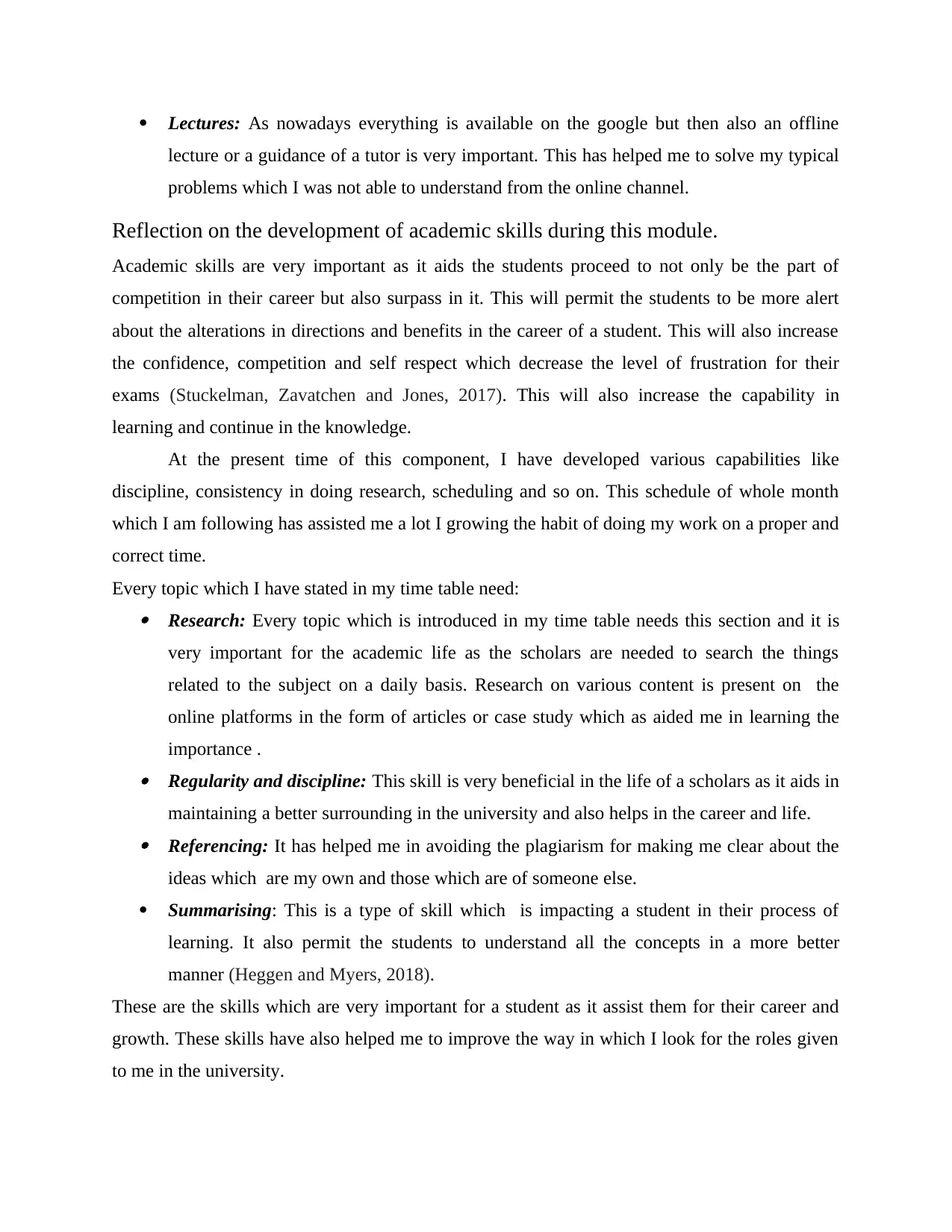
Lectures: As nowadays everything is available on the google but then also an offline
lecture or a guidance of a tutor is very important. This has helped me to solve my typical
problems which I was not able to understand from the online channel.
Reflection on the development of academic skills during this module.
Academic skills are very important as it aids the students proceed to not only be the part of
competition in their career but also surpass in it. This will permit the students to be more alert
about the alterations in directions and benefits in the career of a student. This will also increase
the confidence, competition and self respect which decrease the level of frustration for their
exams (Stuckelman, Zavatchen and Jones, 2017). This will also increase the capability in
learning and continue in the knowledge.
At the present time of this component, I have developed various capabilities like
discipline, consistency in doing research, scheduling and so on. This schedule of whole month
which I am following has assisted me a lot I growing the habit of doing my work on a proper and
correct time.
Every topic which I have stated in my time table need: Research: Every topic which is introduced in my time table needs this section and it is
very important for the academic life as the scholars are needed to search the things
related to the subject on a daily basis. Research on various content is present on the
online platforms in the form of articles or case study which as aided me in learning the
importance . Regularity and discipline: This skill is very beneficial in the life of a scholars as it aids in
maintaining a better surrounding in the university and also helps in the career and life. Referencing: It has helped me in avoiding the plagiarism for making me clear about the
ideas which are my own and those which are of someone else.
Summarising: This is a type of skill which is impacting a student in their process of
learning. It also permit the students to understand all the concepts in a more better
manner (Heggen and Myers, 2018).
These are the skills which are very important for a student as it assist them for their career and
growth. These skills have also helped me to improve the way in which I look for the roles given
to me in the university.
lecture or a guidance of a tutor is very important. This has helped me to solve my typical
problems which I was not able to understand from the online channel.
Reflection on the development of academic skills during this module.
Academic skills are very important as it aids the students proceed to not only be the part of
competition in their career but also surpass in it. This will permit the students to be more alert
about the alterations in directions and benefits in the career of a student. This will also increase
the confidence, competition and self respect which decrease the level of frustration for their
exams (Stuckelman, Zavatchen and Jones, 2017). This will also increase the capability in
learning and continue in the knowledge.
At the present time of this component, I have developed various capabilities like
discipline, consistency in doing research, scheduling and so on. This schedule of whole month
which I am following has assisted me a lot I growing the habit of doing my work on a proper and
correct time.
Every topic which I have stated in my time table need: Research: Every topic which is introduced in my time table needs this section and it is
very important for the academic life as the scholars are needed to search the things
related to the subject on a daily basis. Research on various content is present on the
online platforms in the form of articles or case study which as aided me in learning the
importance . Regularity and discipline: This skill is very beneficial in the life of a scholars as it aids in
maintaining a better surrounding in the university and also helps in the career and life. Referencing: It has helped me in avoiding the plagiarism for making me clear about the
ideas which are my own and those which are of someone else.
Summarising: This is a type of skill which is impacting a student in their process of
learning. It also permit the students to understand all the concepts in a more better
manner (Heggen and Myers, 2018).
These are the skills which are very important for a student as it assist them for their career and
growth. These skills have also helped me to improve the way in which I look for the roles given
to me in the university.
Paraphrase This Document
Need a fresh take? Get an instant paraphrase of this document with our AI Paraphraser
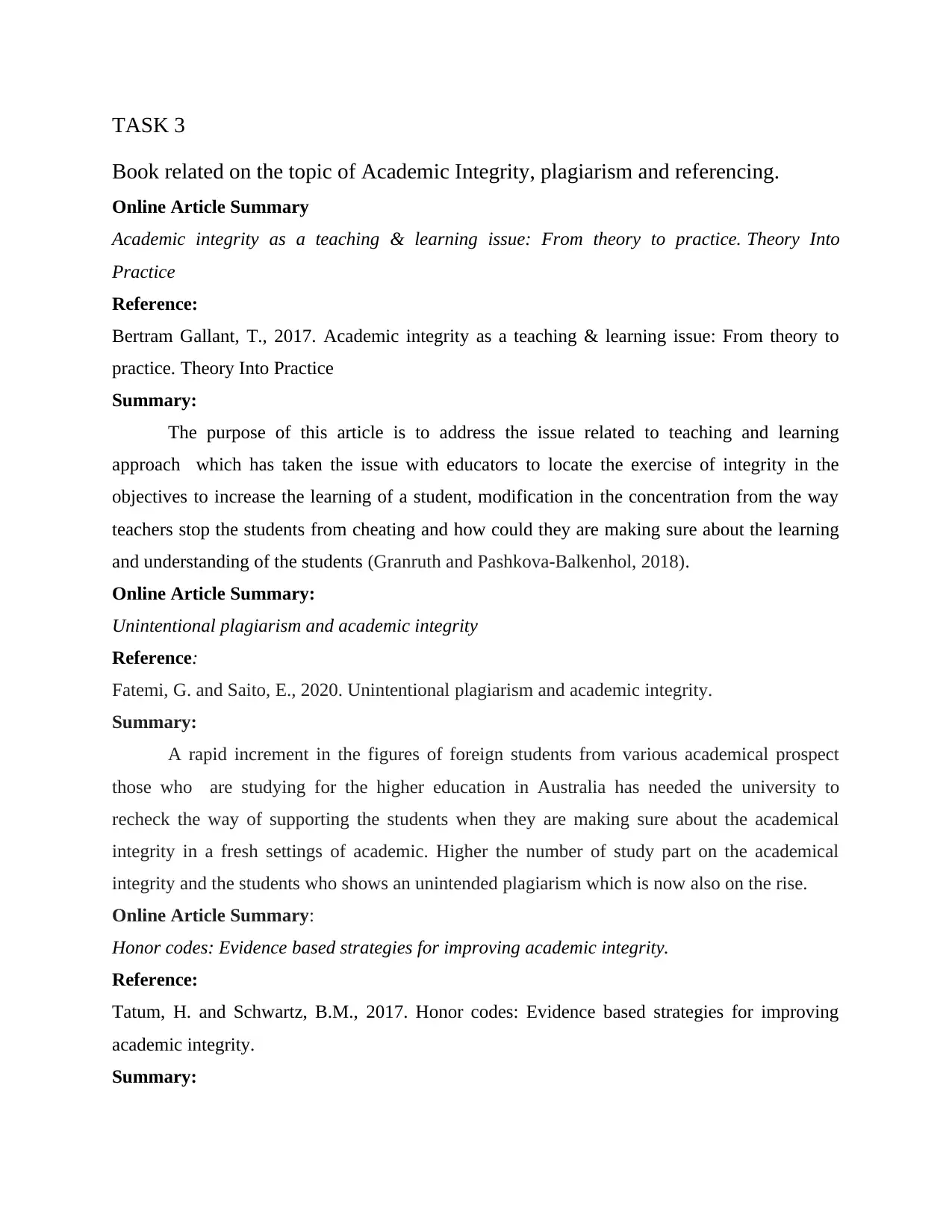
TASK 3
Book related on the topic of Academic Integrity, plagiarism and referencing.
Online Article Summary
Academic integrity as a teaching & learning issue: From theory to practice. Theory Into
Practice
Reference:
Bertram Gallant, T., 2017. Academic integrity as a teaching & learning issue: From theory to
practice. Theory Into Practice
Summary:
The purpose of this article is to address the issue related to teaching and learning
approach which has taken the issue with educators to locate the exercise of integrity in the
objectives to increase the learning of a student, modification in the concentration from the way
teachers stop the students from cheating and how could they are making sure about the learning
and understanding of the students (Granruth and Pashkova-Balkenhol, 2018).
Online Article Summary:
Unintentional plagiarism and academic integrity
Reference:
Fatemi, G. and Saito, E., 2020. Unintentional plagiarism and academic integrity.
Summary:
A rapid increment in the figures of foreign students from various academical prospect
those who are studying for the higher education in Australia has needed the university to
recheck the way of supporting the students when they are making sure about the academical
integrity in a fresh settings of academic. Higher the number of study part on the academical
integrity and the students who shows an unintended plagiarism which is now also on the rise.
Online Article Summary:
Honor codes: Evidence based strategies for improving academic integrity.
Reference:
Tatum, H. and Schwartz, B.M., 2017. Honor codes: Evidence based strategies for improving
academic integrity.
Summary:
Book related on the topic of Academic Integrity, plagiarism and referencing.
Online Article Summary
Academic integrity as a teaching & learning issue: From theory to practice. Theory Into
Practice
Reference:
Bertram Gallant, T., 2017. Academic integrity as a teaching & learning issue: From theory to
practice. Theory Into Practice
Summary:
The purpose of this article is to address the issue related to teaching and learning
approach which has taken the issue with educators to locate the exercise of integrity in the
objectives to increase the learning of a student, modification in the concentration from the way
teachers stop the students from cheating and how could they are making sure about the learning
and understanding of the students (Granruth and Pashkova-Balkenhol, 2018).
Online Article Summary:
Unintentional plagiarism and academic integrity
Reference:
Fatemi, G. and Saito, E., 2020. Unintentional plagiarism and academic integrity.
Summary:
A rapid increment in the figures of foreign students from various academical prospect
those who are studying for the higher education in Australia has needed the university to
recheck the way of supporting the students when they are making sure about the academical
integrity in a fresh settings of academic. Higher the number of study part on the academical
integrity and the students who shows an unintended plagiarism which is now also on the rise.
Online Article Summary:
Honor codes: Evidence based strategies for improving academic integrity.
Reference:
Tatum, H. and Schwartz, B.M., 2017. Honor codes: Evidence based strategies for improving
academic integrity.
Summary:
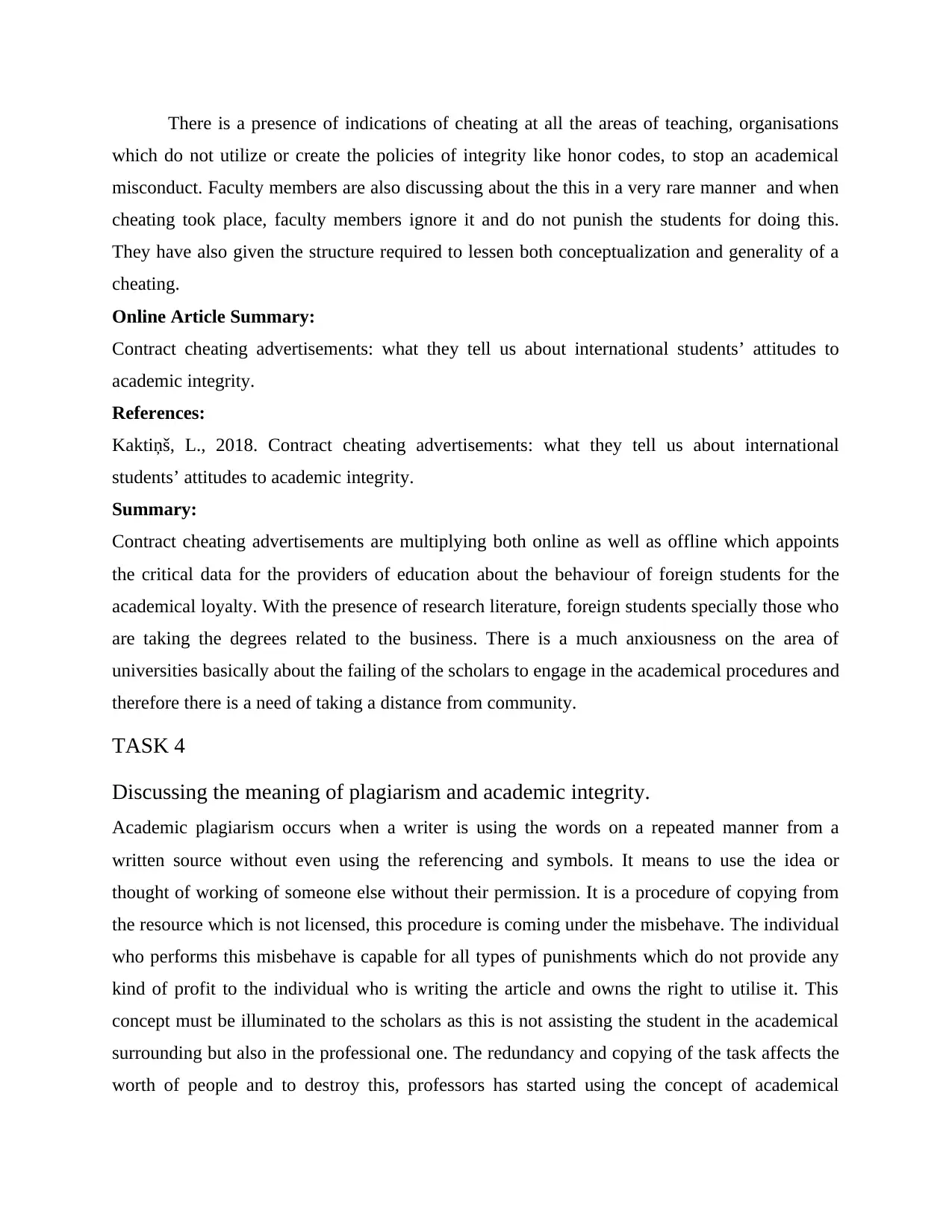
There is a presence of indications of cheating at all the areas of teaching, organisations
which do not utilize or create the policies of integrity like honor codes, to stop an academical
misconduct. Faculty members are also discussing about the this in a very rare manner and when
cheating took place, faculty members ignore it and do not punish the students for doing this.
They have also given the structure required to lessen both conceptualization and generality of a
cheating.
Online Article Summary:
Contract cheating advertisements: what they tell us about international students’ attitudes to
academic integrity.
References:
Kaktiņš, L., 2018. Contract cheating advertisements: what they tell us about international
students’ attitudes to academic integrity.
Summary:
Contract cheating advertisements are multiplying both online as well as offline which appoints
the critical data for the providers of education about the behaviour of foreign students for the
academical loyalty. With the presence of research literature, foreign students specially those who
are taking the degrees related to the business. There is a much anxiousness on the area of
universities basically about the failing of the scholars to engage in the academical procedures and
therefore there is a need of taking a distance from community.
TASK 4
Discussing the meaning of plagiarism and academic integrity.
Academic plagiarism occurs when a writer is using the words on a repeated manner from a
written source without even using the referencing and symbols. It means to use the idea or
thought of working of someone else without their permission. It is a procedure of copying from
the resource which is not licensed, this procedure is coming under the misbehave. The individual
who performs this misbehave is capable for all types of punishments which do not provide any
kind of profit to the individual who is writing the article and owns the right to utilise it. This
concept must be illuminated to the scholars as this is not assisting the student in the academical
surrounding but also in the professional one. The redundancy and copying of the task affects the
worth of people and to destroy this, professors has started using the concept of academical
which do not utilize or create the policies of integrity like honor codes, to stop an academical
misconduct. Faculty members are also discussing about the this in a very rare manner and when
cheating took place, faculty members ignore it and do not punish the students for doing this.
They have also given the structure required to lessen both conceptualization and generality of a
cheating.
Online Article Summary:
Contract cheating advertisements: what they tell us about international students’ attitudes to
academic integrity.
References:
Kaktiņš, L., 2018. Contract cheating advertisements: what they tell us about international
students’ attitudes to academic integrity.
Summary:
Contract cheating advertisements are multiplying both online as well as offline which appoints
the critical data for the providers of education about the behaviour of foreign students for the
academical loyalty. With the presence of research literature, foreign students specially those who
are taking the degrees related to the business. There is a much anxiousness on the area of
universities basically about the failing of the scholars to engage in the academical procedures and
therefore there is a need of taking a distance from community.
TASK 4
Discussing the meaning of plagiarism and academic integrity.
Academic plagiarism occurs when a writer is using the words on a repeated manner from a
written source without even using the referencing and symbols. It means to use the idea or
thought of working of someone else without their permission. It is a procedure of copying from
the resource which is not licensed, this procedure is coming under the misbehave. The individual
who performs this misbehave is capable for all types of punishments which do not provide any
kind of profit to the individual who is writing the article and owns the right to utilise it. This
concept must be illuminated to the scholars as this is not assisting the student in the academical
surrounding but also in the professional one. The redundancy and copying of the task affects the
worth of people and to destroy this, professors has started using the concept of academical
⊘ This is a preview!⊘
Do you want full access?
Subscribe today to unlock all pages.

Trusted by 1+ million students worldwide
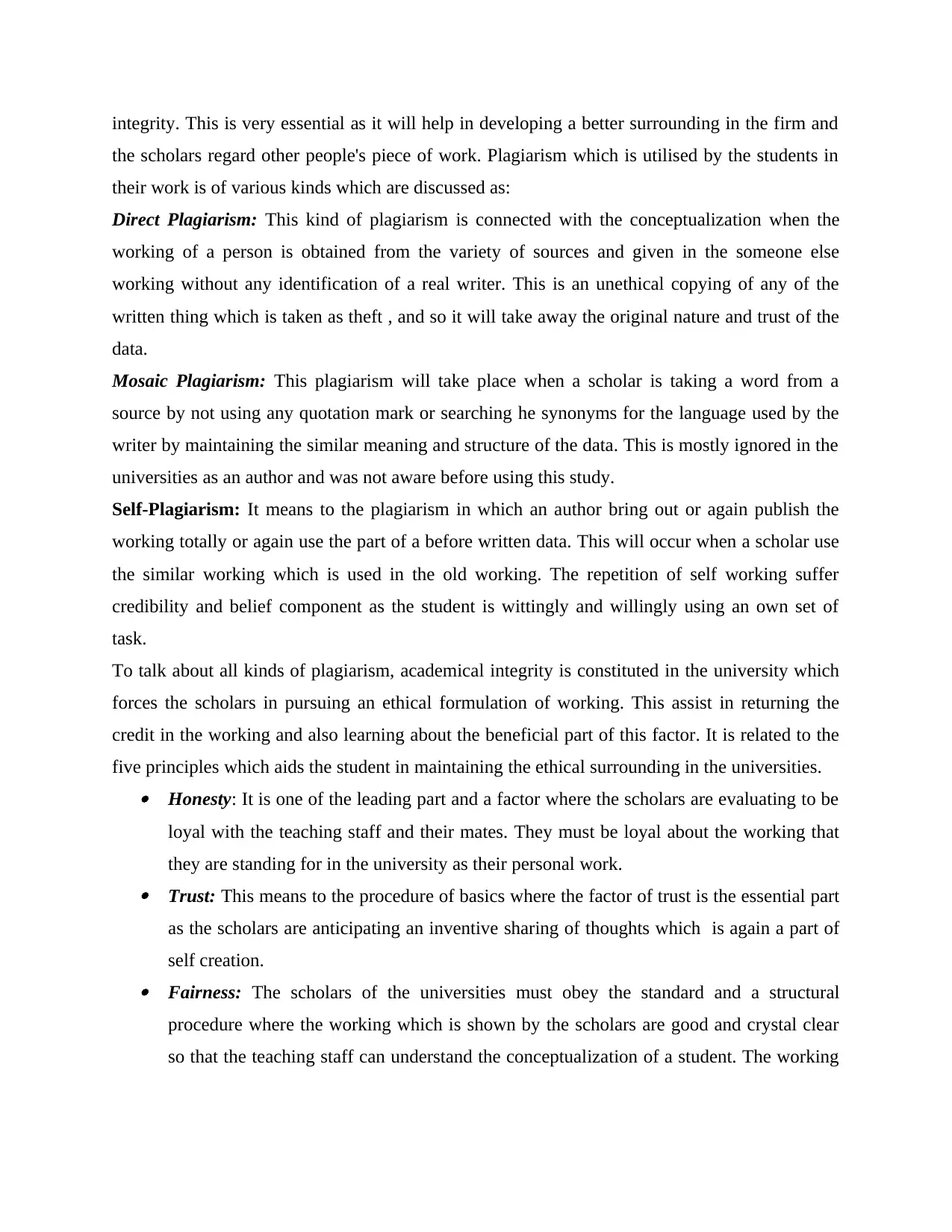
integrity. This is very essential as it will help in developing a better surrounding in the firm and
the scholars regard other people's piece of work. Plagiarism which is utilised by the students in
their work is of various kinds which are discussed as:
Direct Plagiarism: This kind of plagiarism is connected with the conceptualization when the
working of a person is obtained from the variety of sources and given in the someone else
working without any identification of a real writer. This is an unethical copying of any of the
written thing which is taken as theft , and so it will take away the original nature and trust of the
data.
Mosaic Plagiarism: This plagiarism will take place when a scholar is taking a word from a
source by not using any quotation mark or searching he synonyms for the language used by the
writer by maintaining the similar meaning and structure of the data. This is mostly ignored in the
universities as an author and was not aware before using this study.
Self-Plagiarism: It means to the plagiarism in which an author bring out or again publish the
working totally or again use the part of a before written data. This will occur when a scholar use
the similar working which is used in the old working. The repetition of self working suffer
credibility and belief component as the student is wittingly and willingly using an own set of
task.
To talk about all kinds of plagiarism, academical integrity is constituted in the university which
forces the scholars in pursuing an ethical formulation of working. This assist in returning the
credit in the working and also learning about the beneficial part of this factor. It is related to the
five principles which aids the student in maintaining the ethical surrounding in the universities. Honesty: It is one of the leading part and a factor where the scholars are evaluating to be
loyal with the teaching staff and their mates. They must be loyal about the working that
they are standing for in the university as their personal work. Trust: This means to the procedure of basics where the factor of trust is the essential part
as the scholars are anticipating an inventive sharing of thoughts which is again a part of
self creation. Fairness: The scholars of the universities must obey the standard and a structural
procedure where the working which is shown by the scholars are good and crystal clear
so that the teaching staff can understand the conceptualization of a student. The working
the scholars regard other people's piece of work. Plagiarism which is utilised by the students in
their work is of various kinds which are discussed as:
Direct Plagiarism: This kind of plagiarism is connected with the conceptualization when the
working of a person is obtained from the variety of sources and given in the someone else
working without any identification of a real writer. This is an unethical copying of any of the
written thing which is taken as theft , and so it will take away the original nature and trust of the
data.
Mosaic Plagiarism: This plagiarism will take place when a scholar is taking a word from a
source by not using any quotation mark or searching he synonyms for the language used by the
writer by maintaining the similar meaning and structure of the data. This is mostly ignored in the
universities as an author and was not aware before using this study.
Self-Plagiarism: It means to the plagiarism in which an author bring out or again publish the
working totally or again use the part of a before written data. This will occur when a scholar use
the similar working which is used in the old working. The repetition of self working suffer
credibility and belief component as the student is wittingly and willingly using an own set of
task.
To talk about all kinds of plagiarism, academical integrity is constituted in the university which
forces the scholars in pursuing an ethical formulation of working. This assist in returning the
credit in the working and also learning about the beneficial part of this factor. It is related to the
five principles which aids the student in maintaining the ethical surrounding in the universities. Honesty: It is one of the leading part and a factor where the scholars are evaluating to be
loyal with the teaching staff and their mates. They must be loyal about the working that
they are standing for in the university as their personal work. Trust: This means to the procedure of basics where the factor of trust is the essential part
as the scholars are anticipating an inventive sharing of thoughts which is again a part of
self creation. Fairness: The scholars of the universities must obey the standard and a structural
procedure where the working which is shown by the scholars are good and crystal clear
so that the teaching staff can understand the conceptualization of a student. The working
Paraphrase This Document
Need a fresh take? Get an instant paraphrase of this document with our AI Paraphraser
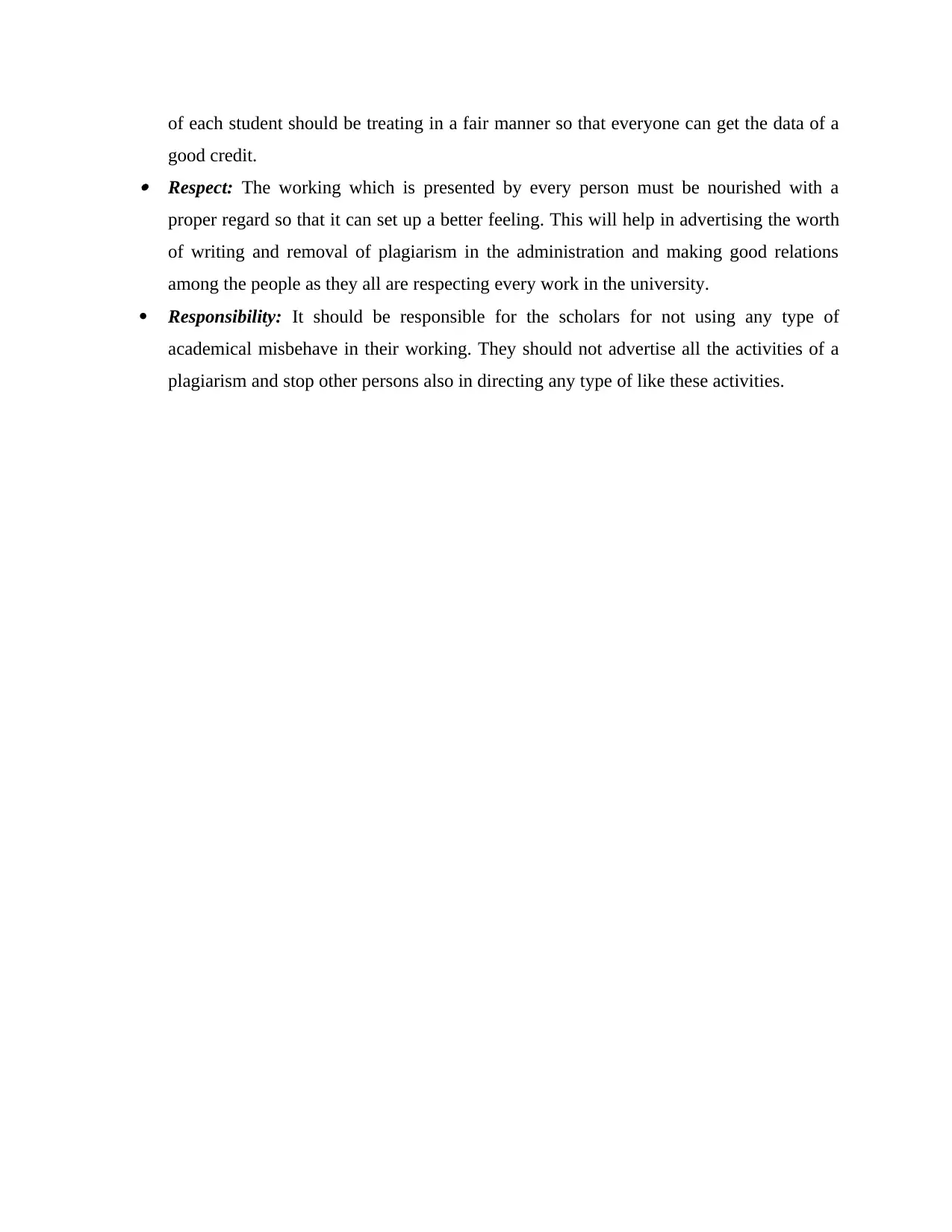
of each student should be treating in a fair manner so that everyone can get the data of a
good credit. Respect: The working which is presented by every person must be nourished with a
proper regard so that it can set up a better feeling. This will help in advertising the worth
of writing and removal of plagiarism in the administration and making good relations
among the people as they all are respecting every work in the university.
Responsibility: It should be responsible for the scholars for not using any type of
academical misbehave in their working. They should not advertise all the activities of a
plagiarism and stop other persons also in directing any type of like these activities.
good credit. Respect: The working which is presented by every person must be nourished with a
proper regard so that it can set up a better feeling. This will help in advertising the worth
of writing and removal of plagiarism in the administration and making good relations
among the people as they all are respecting every work in the university.
Responsibility: It should be responsible for the scholars for not using any type of
academical misbehave in their working. They should not advertise all the activities of a
plagiarism and stop other persons also in directing any type of like these activities.
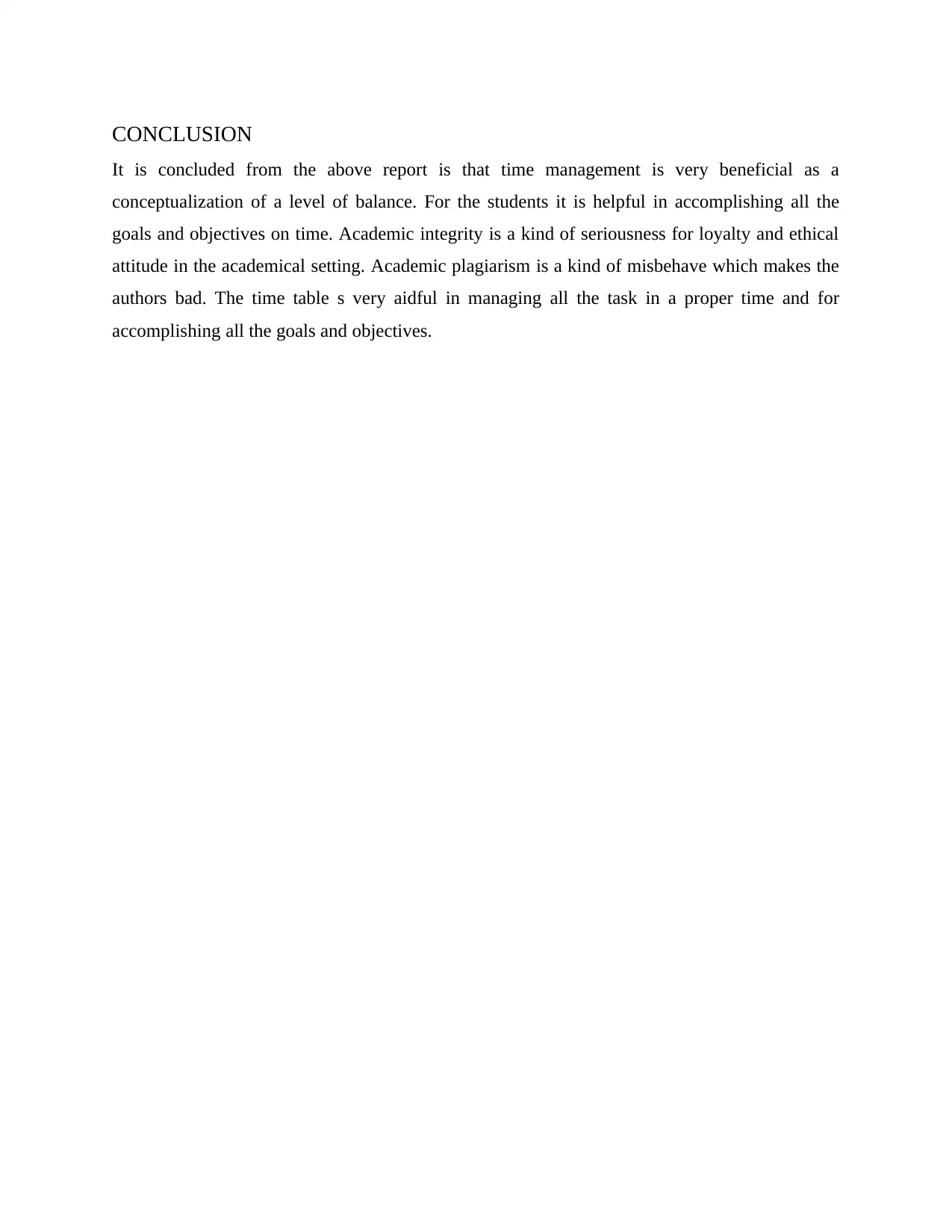
CONCLUSION
It is concluded from the above report is that time management is very beneficial as a
conceptualization of a level of balance. For the students it is helpful in accomplishing all the
goals and objectives on time. Academic integrity is a kind of seriousness for loyalty and ethical
attitude in the academical setting. Academic plagiarism is a kind of misbehave which makes the
authors bad. The time table s very aidful in managing all the task in a proper time and for
accomplishing all the goals and objectives.
It is concluded from the above report is that time management is very beneficial as a
conceptualization of a level of balance. For the students it is helpful in accomplishing all the
goals and objectives on time. Academic integrity is a kind of seriousness for loyalty and ethical
attitude in the academical setting. Academic plagiarism is a kind of misbehave which makes the
authors bad. The time table s very aidful in managing all the task in a proper time and for
accomplishing all the goals and objectives.
⊘ This is a preview!⊘
Do you want full access?
Subscribe today to unlock all pages.

Trusted by 1+ million students worldwide
1 out of 14
Related Documents
Your All-in-One AI-Powered Toolkit for Academic Success.
+13062052269
info@desklib.com
Available 24*7 on WhatsApp / Email
![[object Object]](/_next/static/media/star-bottom.7253800d.svg)
Unlock your academic potential
Copyright © 2020–2026 A2Z Services. All Rights Reserved. Developed and managed by ZUCOL.

